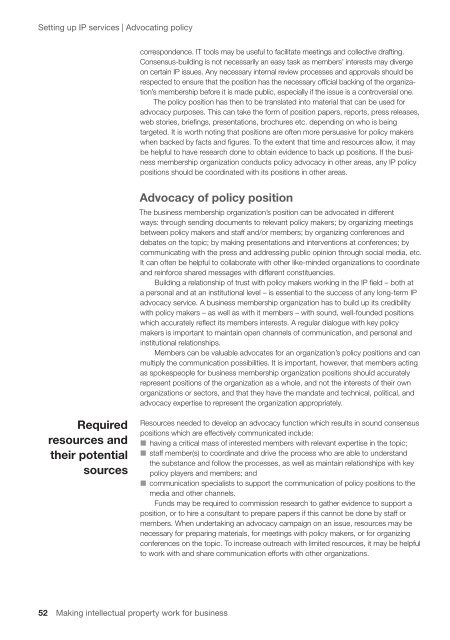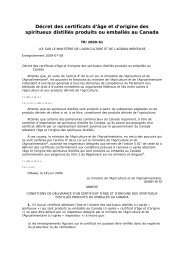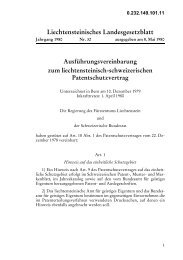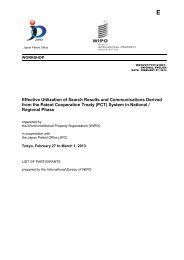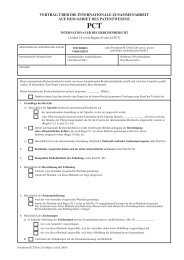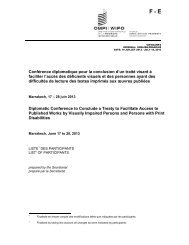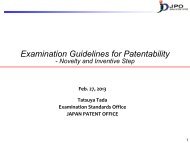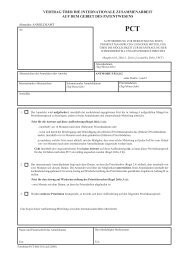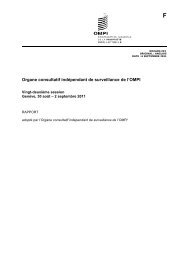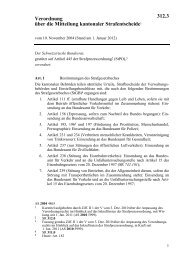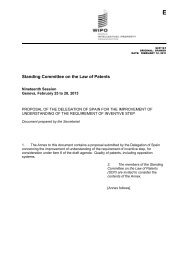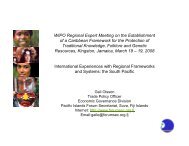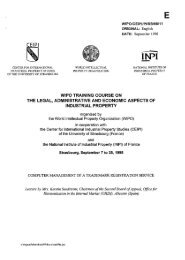Making intellectual property work for business - World Intellectual ...
Making intellectual property work for business - World Intellectual ...
Making intellectual property work for business - World Intellectual ...
Create successful ePaper yourself
Turn your PDF publications into a flip-book with our unique Google optimized e-Paper software.
Setting up IP services | Advocating policy<br />
Required<br />
resources and<br />
their potential<br />
sources<br />
52 <strong>Making</strong> <strong>intellectual</strong> <strong>property</strong> <strong>work</strong> <strong>for</strong> <strong>business</strong><br />
correspondence. IT tools may be useful to facilitate meetings and collective drafting.<br />
Consensus-building is not necessarily an easy task as members’ interests may diverge<br />
on certain IP issues. Any necessary internal review processes and approvals should be<br />
respected to ensure that the position has the necessary official backing of the organization’s<br />
membership be<strong>for</strong>e it is made public, especially if the issue is a controversial one.<br />
The policy position has then to be translated into material that can be used <strong>for</strong><br />
advocacy purposes. This can take the <strong>for</strong>m of position papers, reports, press releases,<br />
web stories, briefings, presentations, brochures etc. depending on who is being<br />
targeted. It is worth noting that positions are often more persuasive <strong>for</strong> policy makers<br />
when backed by facts and figures. To the extent that time and resources allow, it may<br />
be helpful to have research done to obtain evidence to back up positions. If the <strong>business</strong><br />
membership organization conducts policy advocacy in other areas, any IP policy<br />
positions should be coordinated with its positions in other areas.<br />
Advocacy of policy position<br />
The <strong>business</strong> membership organization’s position can be advocated in different<br />
ways: through sending documents to relevant policy makers; by organizing meetings<br />
between policy makers and staff and/or members; by organizing conferences and<br />
debates on the topic; by making presentations and interventions at conferences; by<br />
communicating with the press and addressing public opinion through social media, etc.<br />
It can often be helpful to collaborate with other like-minded organizations to coordinate<br />
and rein<strong>for</strong>ce shared messages with different constituencies.<br />
Building a relationship of trust with policy makers <strong>work</strong>ing in the IP field – both at<br />
a personal and at an institutional level – is essential to the success of any long-term IP<br />
advocacy service. A <strong>business</strong> membership organization has to build up its credibility<br />
with policy makers – as well as with it members – with sound, well-founded positions<br />
which accurately reflect its members interests. A regular dialogue with key policy<br />
makers is important to maintain open channels of communication, and personal and<br />
institutional relationships.<br />
Members can be valuable advocates <strong>for</strong> an organization’s policy positions and can<br />
multiply the communication possibilities. It is important, however, that members acting<br />
as spokespeople <strong>for</strong> <strong>business</strong> membership organization positions should accurately<br />
represent positions of the organization as a whole, and not the interests of their own<br />
organizations or sectors, and that they have the mandate and technical, political, and<br />
advocacy expertise to represent the organization appropriately.<br />
Resources needed to develop an advocacy function which results in sound consensus<br />
positions which are effectively communicated include:<br />
■■<br />
having a critical mass of interested members with relevant expertise in the topic;<br />
■■<br />
staff member(s) to coordinate and drive the process who are able to understand<br />
the substance and follow the processes, as well as maintain relationships with key<br />
policy players and members; and<br />
■■<br />
communication specialists to support the communication of policy positions to the<br />
media and other channels.<br />
Funds may be required to commission research to gather evidence to support a<br />
position, or to hire a consultant to prepare papers if this cannot be done by staff or<br />
members. When undertaking an advocacy campaign on an issue, resources may be<br />
necessary <strong>for</strong> preparing materials, <strong>for</strong> meetings with policy makers, or <strong>for</strong> organizing<br />
conferences on the topic. To increase outreach with limited resources, it may be helpful<br />
to <strong>work</strong> with and share communication ef<strong>for</strong>ts with other organizations.


